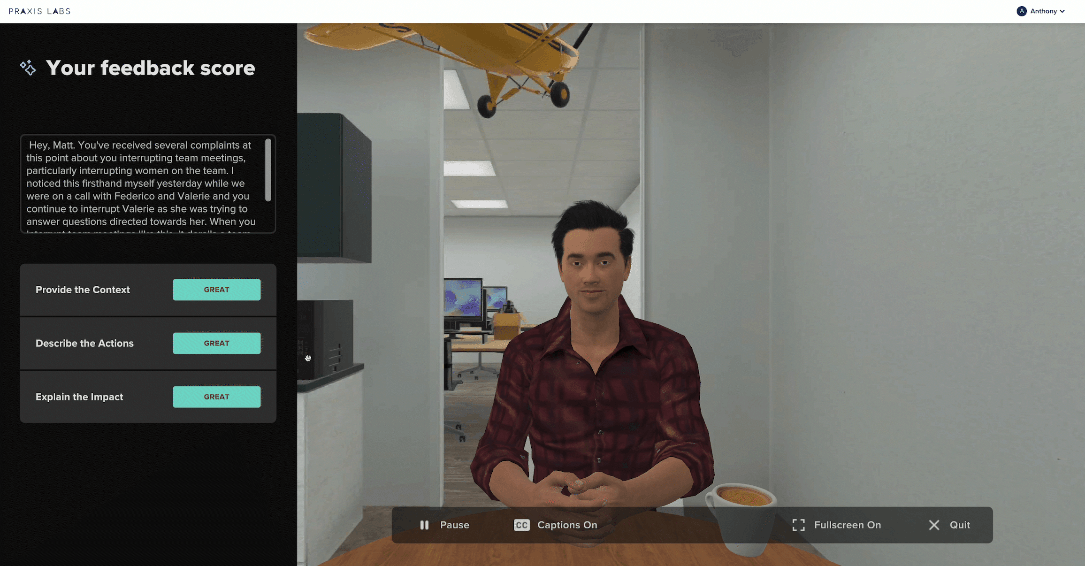- DEIJ
Five Activities to Build Empathy in the Workplace
It goes without saying that we’ve experienced monumental changes in the last two years. The workplace looks very different and even the very nature of work itself feels unfamiliar. As a result, the skills needed to be effective in these changing environments have also changed and evolved.
Empathy, or the ability to share and understand the internal states of others, is an important skill in both in-person offices and remote settings. Yet the way it is presented and experienced can be quite different. For example, authentic communication may be harder to detect over Zoom and Slack than in-person meetings and interactions.
Workplaces can implement several types of activities and exercises that help employees practice and build empathy. Many of them are best enjoyed through immersive learning. New and emerging technology allows learners to navigate real-world experiences in a safe, simulated environment.
What is Empathy? Two Types to Know
Empathy is now a workplace buzzword. Its use spans anything from feeling something deeply to taking the time to understand a perspective different from one’s own. Before we dive into the importance of empathy in today’s modern workplace, let’s explore what it actually is.
Psychologists will typically define empathy in two ways, cognitive and emotional empathy. While emotional empathy is associated with automatic and unconscious processing, cognitive empathy is associated with mentalizing or perspective-taking. It concerns the explicit effort to understand how you might feel if placed in the circumstances of another.
Both experience-sharing and perspective-taking have been proven to predict prosocial or helping behavior that benefits others. Research strongly suggests that empathy in the workplace is positively related to job performance. One wide-reaching study found that managers who practice compassionate leadership toward direct reports are viewed as better performers by their bosses. In turn, leaders rated as empathetic by their team were also rated as high performing by their boss.
The best part? Empathy is something that every person in the workplace can learn.
Activities and Exercises that Practice and Build Empathy
Cognitive empathy is not something people are innately born with, and there are exercises that can build and strengthen these important muscles. A soft skill, like any other skill, must be practiced. Here are some examples of these types of activities:
1. Active Listening
Give others your full attention in order to better understand them. This can look like being present in conversations, giving nonverbal cues, asking connective questions, and paraphrasing. Going a bit further, empathetic active listening puts a special emphasis on understanding the other person’s emotional experience.
2. Perspective-taking
Workplaces are often the most diverse environments we encounter in our lives. Taking the time to understand and imagine what it is like to experience the world as someone other than yourself can be a valuable way to deepen relationships with your colleagues. Using immersive learning technology, such as VR and MR, can be a huge help here. It can allow employees to experience situations through the eyes of colleagues from different races, genders, abilities, and backgrounds than them. This helps employees gain a better understanding and appreciation for the challenges their colleagues face on a daily basis.
3. Understand History and Context
No company or person exists in a vacuum, and therefore all must put in a conscious effort to learn about the diverse backgrounds and past experiences of team members. A robust and, importantly, ongoing Diversity, Equity, Inclusion and Justice (DEIJ) training strategy goes a long way in building this understanding. History can be a powerful tool to help employees understand why inequities persist over time and to help reimagine a more inclusive and equitable society.
4. Practice Empathetic Language:
In person, a large part of this is body language, while over Zoom it has more to do with verbal responses. One should avoid asking direct questions, arguing with what is being said, making assumptions, or disputing facts. Instead, practice acknowledging feelings, showing sincere interest, and being supportive and encouraging.
5. Take Accountability
How we respond to workplace bias and discrimination is a crucial piece of cultivating an empathetic workplace. The key is to communicate clear expectations for all team members and create a system of ongoing feedback. This type of open-door policy builds higher trust within the team, which leads to better business outcomes.
It is also important to note that some of these recommended empathy-building behaviors can be more difficult for some than others, such as those who are neurodivergent. Ableism is often overlooked, and can seem more invisible when not interacting with colleagues in-person on a daily basis. In an empathetic workplace environment, these differences can be accepted and even celebrated.
Empathy and the Evolving Workplace
A 2021 Businessolver study found that a whopping 84% of CEOs and 70% of employees believe empathy drives better business outcomes. Yet, many leaders don’t know how to build empathy, especially in our “new normal” of hybrid and remote work.
Fortunately, with new research and major advancements in immersive learning technology, workplaces can practice empathy through a variety of exercises and activities.








